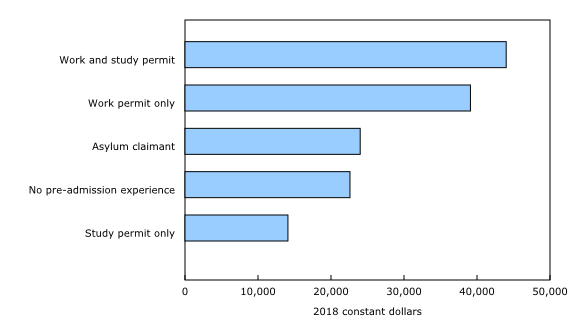Obtaining a Work Permit After Studying in Canada
The most popular way to stay in Canada after graduation is to apply for a Post-Graduation Work Permit. This article will provide guidance on who is eligible to apply for this permit, how to apply, and how it actually works:
RELATED ARTICLES

Post-Graduation Work Permit
The Post-Graduation Work Permit Program is managed by the federal government. Immigration, Refugees and Citizenship Canada (IRCC) administers the application process. Thus, you must apply directly to the IRCC.
What Is It?
A Post-Graduation Work Permit (PGWP) is a legal document that permits foreign students who graduated from Canadian tertiary learning institutions to engage in employment in Canada. The PGWP is a special kind of work permit with certain peculiarities:
- It is an open work permit. This means foreign graduates are allowed to work for any employer (including multiple employers), anywhere in Canada.
- Under the PGWP, foreign graduates can work in any occupation, even one unrelated to their studies.
- The PGWP allows graduates to work full-time, part-time, or be self-employed.
- The PGWP does not require a Labour Market Impact Assessment (LMIA). This means that Canadian employers can hire international graduates without assessing the impact on the local job market of hiring a foreign national; this in turn may make it easier for graduates to land a job.
Who Is Eligible?
To be eligible for a Post-Graduation Work Permit, a foreign national must:
- Be at least 18 years of age;
- Have or had a valid Canadian Study Permit;
- Complete a study program at a Designated Learning Institution (DLI) that was at least eight months long and led to a degree, diploma, or certificate;
- Have been a full-time student during each semester of the study program without taking time away from studies (taking a ‘gap’);
- Have completed at least 50% of the study in-person;
- Have a transcript or official Letter of Completion from the educational institution confirming that he or she is eligible to graduate and meets the requirements of the PGWP.
How Long is a PGWP Valid?
The validity of the PGWP depends on the length of the graduate’s study program. The minimum term is eight months. The maximum length of validity is three years. In the table below, you can determine the length of validity of the PGWP based on the duration of a particular study program.
What is a Letter of Completion?
A Letter of Completion is an official document proving that you have completed all the requirements of your study program (such as receiving your final grade or submitting your thesis). It usually becomes available automatically and may be downloaded by students from the university web pages. However, some educational institutions may have another procedure. Note that the Letter of Completion must state the length of your study program; otherwise, it will not be accepted by IRCC.
Duration of study program | Lengths of PGWP validity |
Less than eight months | Not eligible for a PGWP |
Eight months – two years | PGWP is valid for up to the same length as the study program (e.g. 10-month program = 10 months’ validity) |
More than two years | Three years |
More than one program completed within two years | Length of both programs combined (if the combined length is two years or longer, the work permit should be valid for three years) |
How to Apply?
There are two ways to apply for a PGWP:
- From inside Canada, if you still have a valid Study Permit (the SP typically remains valid 90 days beyond your graduation date);
- From outside Canada, if you leave Canada as your SP expires.
Remember that you have 180 days from the date your Letter of Completion becomes available to apply for a Post-Graduation Work Permit.
Step-by-step instructions on applying for a PGWP:
- Gather all required documents: You need the following set of documents ready before applying for the Post-Graduation Work Permit:
- Letter of Completion;
- Transcript;
- Medical exam report;
- Letter of Explanation to describe your purpose and desire to stay in Canada.
- Apply for a PGWP: You must fill out all required forms, pay the fees, and submit this application either online or by mail, along with the supporting documents. If your SP has expired but you want to apply from inside Canada, you must additionally apply to restore your student status and pay additional fees.
- Wait for approval: Your application for a PGWP will be processed within 81 days. If you need to restore your student status, the processing time will take longer.
Canada’s Post-Graduation Work Permit is a type of Temporary Work Permit (TWP). The process of obtaining the PGWP is simpler than that for a regular TWP. It’s also easier for a Canadian employer to hire PGWP-holders than TWP-holders. The PGWP is a fast-track option for obtaining permanent residence in Canada, with the aim being to help foreign graduates gain Canadian work experience. Below, you will find some key differences between the PGWP and TWP.
Temporary Work Permit | Post-Graduation Work Permit | |
Status of holder | Temporary resident | Temporary resident |
Eligibility criteria | Basic set of requirements | Basic set of requirements + |
Can it be renewed? | Yes | No. You can get a PGWP only once |
Duration of permit | Up to two years | From eight months to three years; it depends on the length of the study program |
Types of work permit |
It depends on the type of work you will do in Canada | Open work permit |
Processing time | Up to 189 days | 65 days |
Fees | From CAN $155 | From CAN $255 |
Necessity of Labour Market Impact Assessment (LMIA) |
| No |
If you want to stay in Canada after the PGWP, there are several programs that can match your desire. PGWP provides you with valuable Canadian work experience that gives you access to permanent residence options:
- The Canadian Experience Class is the most common way to transition from temporary resident status to permanent resident status. The largest number of people immigrate to Canada under this program. It is also actively used as a final step for students who work on temporary visas to obtain permanent residence in Canada.
- The Provincial Nominee Program (PNP): many provinces and territories offer graduates who have finished their studies in that particular region the opportunity to work and stay on in Canada. There are program streams specifically for students in Alberta, British Columbia, Manitoba, Ontario, Saskatchewan, Newfoundland and Labrador, Nova Scotia, and New Brunswick.
You can find out more about opportunities to obtain permanent residence in Canada after your studies in our article.
However, you can also choose to apply for a new Temporary Work Permit and stay in Canada as a temporary resident.
To ensure the best chances of getting approval for your Post-Graduation Work Permit application, contact our team. We can help you to choose the best way for applying for PGWP based on your personal situation and merits.
The importance of providing clear, complete, and accurate information throughout the process cannot be overstated. It is usually a good idea to seek the assistance of a professional who is an expert in the process so that you avoid making mistakes or providing incorrect information at any step of the process. We can assist you in all stages of your Post-Graduation Work Permit application as well as in the restoration of your student status; we will make the application process as efficient and stress-free.
If you are unsure about your likelihood of successfully obtaining a Post-Graduation Work Permit, contact us for a free evaluation. If you have any other questions that are not addressed in this article, please contact us and we will be happy to help.

